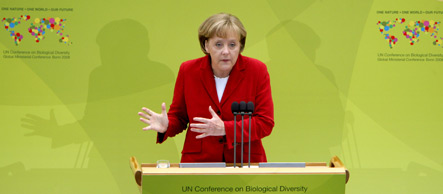“The chancellor is not really present on the domestic front,” the Social Democrats’ parliamentary leader, Peter Struck, told Deutschlandfunk radio.
“She does not lead, she does not step in,” added Struck. Struck and Environment Minister Sigmar Gabriel, also a Social Democrat, accused Merkel of portraying herself as a leader in the fight against climate change but allowing her Christian Democrats (CDU/CSU) to hinder progress in that regard.
“She often makes strong statements at press conferences but does little to stop her own party blocking progress,” said Struck. Gabriel added: “It cannot be that the chancellor cultivates an image as a champion of the environment but in reality the Christian Democrats block everything.”
The secretary general of Merkel’s party, Ronald Pofalla, dismissed the criticism as an attempt by the Social Democrats to deflect attention from their own woes.
Germany’s two biggest parties have governed in a power-sharing coalition since 2005 but strife between the partners are increasingly spilling into the open as they prepare to contest next year’s election.
The situation deteriorated last week when the SPD nominated prominent academic Gesine Schwan to challenge conservative President Horst Köhler for the largely ceremonial post in 2009.
The move drew a sharp rebuke from Merkel, who had shortly before termed her party’s relationship with the Social Democrats as “very, very difficult.”
“We have a president who is respected around the world,” Merkel said. “So it is regrettable that the Social Democrats have put up their own candidate in this step that can only be explained by the internal state of the party.”
German commentators have warned that the Social Democrats’ nomination of Schwan was seen by their partners as a provocation and that it has set the stage for a protracted, acrimonious election campaign. The Social Democrats are hampered by disarray in their own ranks and have hit their lowest poll ratings in two and half years.
The closely watched Politbarometer poll released Friday showed that only 21 percent of registered voters would be willing to cast their ballots for the party in September next year.
The CDU/CSU drew 42 percent of potential voters, up from 38 percent where they had hovered for months.




 Please whitelist us to continue reading.
Please whitelist us to continue reading.